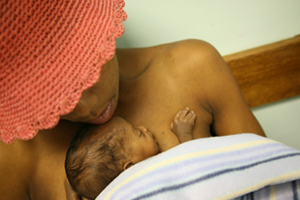Violence against women linked to poor maternal healthcare
26 August 2013
Violence against women is closely linked to inadequate provision of maternal healthcare services in some rural areas in Africa, and a number of policy initiatives are needed to reverse this damaging trend.
Thus argues UCT's Dr Vissého Adjiwanou, who conducted research into the effects of gender norms - regarding violence against women - on the use of maternal health services in rural areas of Ghana, Kenya, Tanzania and Uganda. After exploring how people in these areas perceived physical violence against women, Adjiwanou, who undertook the research alongside Professor Thomas LeGrand of Université de Montréal, found clear links between violence and poor healthcare.
The findings suggest that women who live in areas where gender-based violence was relatively socially 'acceptable' are less likely to have a skilled healthcare worker at the time of giving birth in Ghana, or to reach antenatal care on time in Ghana and Uganda, or to reach four or more antenatal visits in Tanzania.
Adjiwanou, a lecturer at UCT's Centre for Actuarial Research (CARe), suggests several courses of action to improve the use of maternal health services in Africa.
"First, policies to strengthen women's autonomy - which is associated with use of maternal health services - may be insufficient at present, and should be accompanied by actions that limit the negative role and the extent of sociocultural and gender norms by involving other local actors, such as NGOs, health care providers..." he says. "Second, policies are needed not only to strengthen the education of girls, but also to improve curriculum content and to create employment opportunities for them, as well as to develop infrastructures needed to mitigate the isolation of certain communities."
"Finally, and most importantly," he adds, "policies are needed to reduce the high level of fertility in rural Africa, as fertility control is associated with less restrictive gender systems."
Adjiwanou and LeGrand concluded that it is not only the physical and social aspects of an environment that affect people's behaviour and health, but also their perceptions of their environment.
"In this study, we found that living in an environment where violence against women was widely accepted had a negative influence on women's autonomy and on their decisions related to seeking healthcare," Adjiwanou said.
Adjiwanou presented these recommendations at a seminar held at UCT in May. A revised version of this research will be presented at the International Population Conference to be held in Busan, Korea, at the end of August.
Story by Yusuf Omar
 This work is licensed under a Creative Commons Attribution-NoDerivatives 4.0 International License.
This work is licensed under a Creative Commons Attribution-NoDerivatives 4.0 International License.
Please view the republishing articles page for more information.









